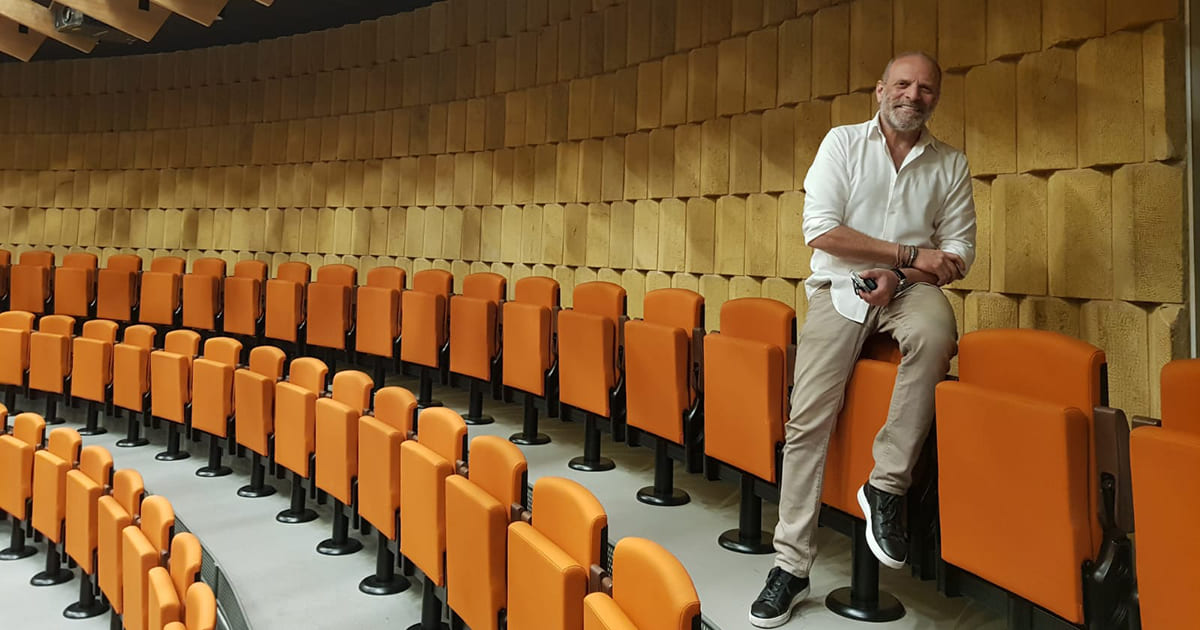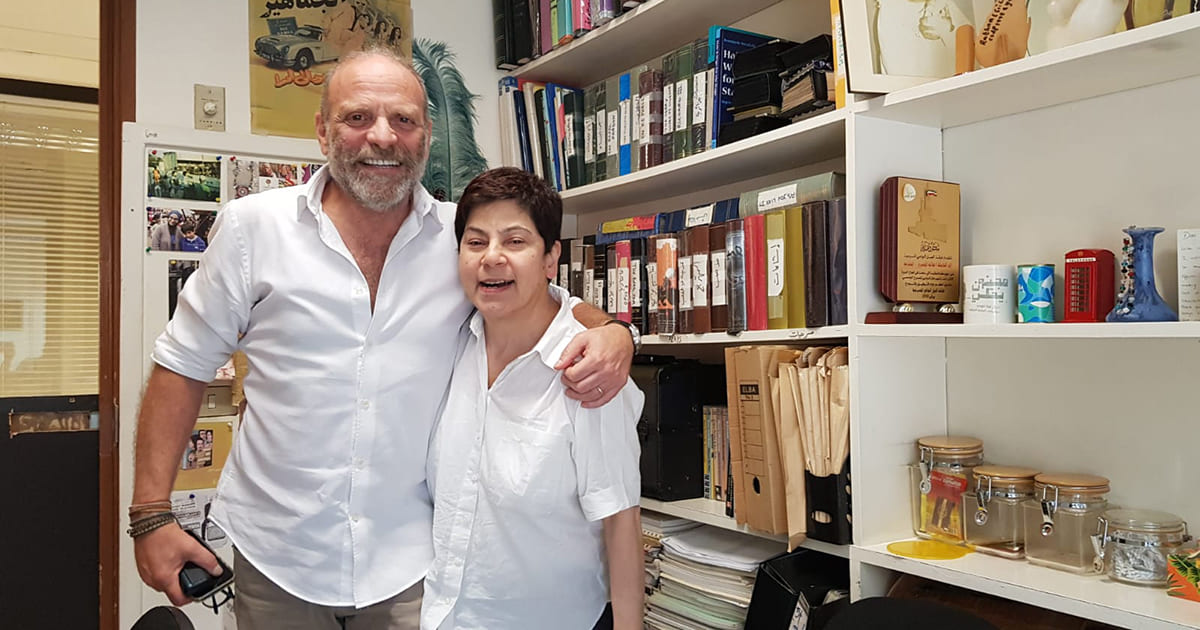Creativity for Alumnus Ramsey Naja Was the Joy that Drowned Everything Else
Advertising guru, thespian and avid learner recounts how the university and its people helped to shape his career.
When alumnus Ramsey Naja (BA ’84) landed in London for what he had originally intended as a brief escape from the Lebanese Civil War in 1985, a chance encounter with a fellow graduate from Beirut University College (BUC) set off a chain of events that would propel him through the golden age of advertising to become one of the region’s most accomplished creative minds.
Up until then, Naja’s work experience had consisted of reporting on Tele Liban’s newly launched English bulletin with classmate Lina Matta. He had been approached by the network during his senior year and stayed on for another year after his graduation in communication arts until politically charged threats related to his work drove him to leave the country for a short respite.
Leaving Beirut and an Unplanned Master’s
As luck would have it, Naja bumped into a former classmate and friend Patrick Pule on the tube from the airport to central London who invited him to stay the night. Pule later took him to see former Chair of the Communication Arts Department Mona Knio, who had taught them both at BUC and had relocated to London.
Knio would not take no for an answer to her suggestion that he stay in England to pursue a master’s. Dismissing his insistence that he had a job and a life waiting for him in Lebanon, she pushed him to apply to the University of Hull and even helped him secure a full scholarship. Naja notified his family in Lebanon, got a student visa and headed off to East Yorkshire.
“Hull was very well known for its excellence in drama and television,” said Naja, recalling a moment that had stuck with him. “So, when the dean expressed his admiration for the high standards I’d been taught in Lebanon after my performance in a major play, it was a huge deal for me because I had used what I had learned at BUC.”
“That’s significant,” he added, “especially since we had studied during the war. I will always be grateful to BUC.”
The Pivot from Drama to Copywriting
After graduating from Hull with a master’s in drama, Naja took up a job at a media consultancy as a resident researcher, tackling topics related to cable and satellite television in the UK, when he was approached by PubliGraphics— a Middle Eastern agency based in London—that was looking for a bilingual Arabic and English copywriter.
“Can you start tomorrow?” asked their creative director, the late Leslie Oakes. And so began Naja’s transition into advertising, where he wrote content for radio, TV, print and outdoor media. “This was in the late 80s, when the industry was marked by extravagance and excess, so I was fascinated by it and all the money it involved, very much like in [the TV series] Mad Men,” he recalled.
Four years later, as it expanded into the Arab World, the agency decided to shut down the London office and offered Naja a post in Saudi Arabia. Preferring to stay in England, he declined but kept in touch with previous colleagues and went freelance.
It was during that time, in the mid-90s, that he met Roy Haddad, who was heading an advertising agency in London called Tihama Al Mona International (TMI). Their meeting concluded with a formal job offer and the familiar question: “Can you start tomorrow?”
Naja was assigned to the team working on the Ford Motor Company Middle East portfolio. “The automotive industry is a school by itself. If you can advertise cars successfully, you can pretty much advertise anything,” he said.
At the turn of the century, American advertising giant J. Walter Thompson (JWT) acquired a majority stake in TMI Group, which by then had offices in Lebanon, the UAE, Saudi Arabia, Syria, Morocco, Egypt, Kuwait, Jordan and the UK. The company’s operations became closely connected to the global company and Naja fielded creative briefs from several offices.
The Return to Beirut and Cut-Throat Competition
Then came the day when Haddad decided to go back to Beirut, offering Naja the opportunity to help him set up the office in Lebanon.
“It was a very rainy summer in London that year, which must have influenced my decision,” recalled Naja jokingly. While his move back home took several trips, setting up the “Levant Creative Hub” for TMI–JWT was swift.
“I think we did some of the best advertising in Lebanon without a shadow of a doubt,” said Naja. In the early 2000s, the competition was fierce and international awards were becoming popular in the region. Around then, he attended the Cannes Lions International Festival of Creativity as a creative director, and remembered thinking “Why is no work from the Arab World being rewarded?”
“We Can Cannes” and the Rise to the Top
Naja returned to the office in Beirut determined to galvanize his team. “I printed the winning work in the outdoor advertising and print categories at Cannes, taped it all over the walls of the agency and announced: ‘We can Cannes!’”
But when he and a senior member of his creative team, Chafic Haddad, entered their first regional awards ceremony in Amman, they left empty-handed. “It was embarrassing,” said Naja. “As we were leaving, I made Chafic turn toward the ballroom, “Never again,’ I said, ‘next time we walk out as heroes,’” he added.
The following year, Naja “happened to be the only one present from the Beirut office, and I collected so many trophies that I had to ask waiters for large trash bags,” he recounted. “My flight from Amman to Beirut was the next day, but I could neither wait nor fit the trophies in my luggage, so I canceled my flight, got on a taxi overnight to Beirut and headed straight to the office where I laid all the trophies on a table at the entrance and went home.”
The event was a watershed in Naja’s career because it pushed his team to up their game. “This was the kind of thinking that ultimately led us—and by default, our competitors—to produce better work from the region.”
By 2004, he was chief creative officer for MENA, and in 2012, CCO of JWT–Middle East and Africa. The network made its debut at the Dubai Lynx, D&AD, One Show, IPG, London International Awards, New York Festival and finally in Cannes in 2015, where the Cairo Office won its first Titanium Lion. In 2016, JWT MENA was declared Network of the Year at the Dubai Lynx, having seized five Grand Prix.
Speaking fondly of the 13 creative people working under him in the Beirut office, who all went on to assume creative director roles, Naja said, “Our desire for improvement was massive; this is how we hit all those milestones that earned us the reputation of a fun agency.”
Gaining Perspective and Current Ventures
After collecting all those awards, Naja felt like the company’s hunger for them had become insatiable. “Global management would put so much pressure on us to deliver on wins,” he said, explaining how this led to clashes in strategic thinking. Eventually, he chose to leave the company and resume his first passion: content creation.
He worked with MBC and other television companies on script writing until one day a former colleague from JWT, Hubert Boulos, reached out to him for help on a client pitch. That brought him back to advertising at the height of the pandemic, and he ended up joining Boulos as a regional executive creative director at DDB Middle East, based in Dubai.
Following a change in management at DDB, both Boulos and Naja decided to strike out on their own and set up Das Kapital—a kind of a “cloud agency” that mobilizes a global network of best-in-class collaborators on demand, as opposed to the heavy and slow-moving traditional agency networks.
Looking Back at BUC Days and Advice to Current Students
When Naja joined BUC in the early 80s, he initially enrolled in the business studies program but quickly gravitated toward the “center of campus” as he refers to the Safadi Fine Arts Building, where the “fun crowd” hung out. Despite his parent’s disapproval, he transferred to communication arts because he felt that theater was his true calling. “This was one of my best decisions,” he said.
Naja’s time at BUC was marked with valuable lessons. He remembered how committed and dedicated they were as a cohort. “Rehearsal schedules were so intense, and we took them so seriously, showing up ahead of time and leaving campus very late at night, despite gas shortages and militiamen’s makeshift checkpoints,” he said.
Naja recalls faculty members’ wisdom with the gratitude of a passionate student. English Literature faculty member Joe Pirri, TV and film professor Janet Hyde Clark, Cultural Studies professor Jean Makdisi, Drama Coordinator Nada Koleilat and Theater Technician Youssef El Rassi—famously known as Mo’allem Youssef—were some of those whose words and lessons stayed with Naja throughout his career.
“BUC was our refuge,” he said, adding: “We were building sets and creating lighting plans for dance shows, right in the middle of the war; it was our escape.”
Comparing those days to Lebanon’s current challenges, Naja reflected on how this “unmatched commitment to creating drowned everything else,” and in a way, that seemed to be a common thread in his career.
“The university never trained me for work in advertising, but it opened my eyes and my mind, regardless of the subject we were studying,” he said, illustrating with an example of how an elective microbiology class was one of the most fascinating experiences in his academic life.
Naja’s message to current students and fresh graduates culminated in three key points: “Go to university with joy. Open your mind. Become better.” He shared how a fellow student once told him that the best morning prayer is when one prays to be a better person by the end of day. “I hope that what I learned at BUC has helped me become one,” he added.

